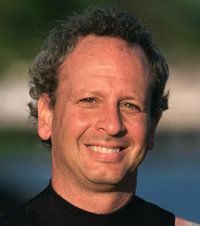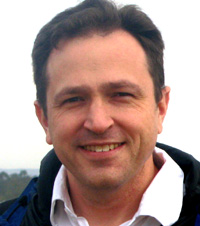Two scientists affiliated with the Institute of Marine Sciences (IMS) at UC Santa Cruz have been awarded 2012 Pew Fellowships in Marine Conservation. Michael Beck, lead scientist of the global marine team at the Nature Conservancy, and Stephan Munch, a fisheries ecologist with the National Oceanic and Atmospheric Administration (NOAA), are both IMS research associates.
The Pew Fellows Program in Marine Conservation is a prestigious program that gives recipients $150,000 for a three-year scientific research or conservation project designed to address critical challenges facing our oceans. Munch will develop tools that predict changes in fish population demographics in response to climate change. Beck's project seeks to promote "green infrastructure" as a strategy for adapting to climate change and to support ecosystem recovery to help make communities less vulnerable to current coastal hazards.
"With the support of the Pew Marine Fellowship, I will be able to show through research and tools that ecosystem restoration is an effective option for hazard mitigation and climate adaptation," Beck said.
The fellowship will allow Beck to pursue the advantages of green infrastructure, such as wetlands and coral reefs, over traditional or "gray" infrastructure, such as sea walls and jetties. His work will include developing tools to help decision makers address coastal risks from climate change and directing resources toward green infrastructure solutions, with a specific focus on tropical nations.
Increasingly, governments are allocating funds for the development of gray infrastructure that attempts to stop sea level rise or storm surges. These structures harm many of the same coastal systems that provide protection. Beck's project will advance ecosystem-based adaptation, both to shield coastal communities and to conserve the natural environment. "I hope that my project will increase decision makers' awareness and managers' use of coastal habitats to protect against climate change impacts," he said.
Munch's fellowship project will develop, validate, and apply statistical methods for forecasting climate-driven changes in fish populations. By experimenting with fish in the laboratory, he will also examine the effects of temperature on fish maturation rates and other traits that affect population size. His efforts will result in a free online tool for predicting these population responses and will make the information available to management bodies and the scientific community.
"The Pew Marine Fellowship will allow me to conduct important research needed to increase our understanding of how organisms and ecosystems in the ocean will react to climate change," Munch said. "These ecological responses will affect not only the characteristics of fish populations, but also the diversity of natural systems and economic productivity of global fisheries."
Characteristics of animals such as population growth rate and lifespan greatly affect the design of conservation and management plans. All of these are affected by climate, which is projected to change substantially in the next 50 years, with significant increases in global mean temperature. Munch's research will result in a large-scale view of the impact of these changes on fisheries, including responses of species for which there is now little relevant data.
The Pew Fellows Program in Marine Conservation has awarded 125 fellowships to recipients from 32 countries. The Pew Marine Fellowships fund science and other projects that address critical challenges in the conservation of the oceans. The program is managed by the Pew Environment Group, based in Washington, D.C. The Pew Environment Group is the conservation arm of The Pew Charitable Trusts.




